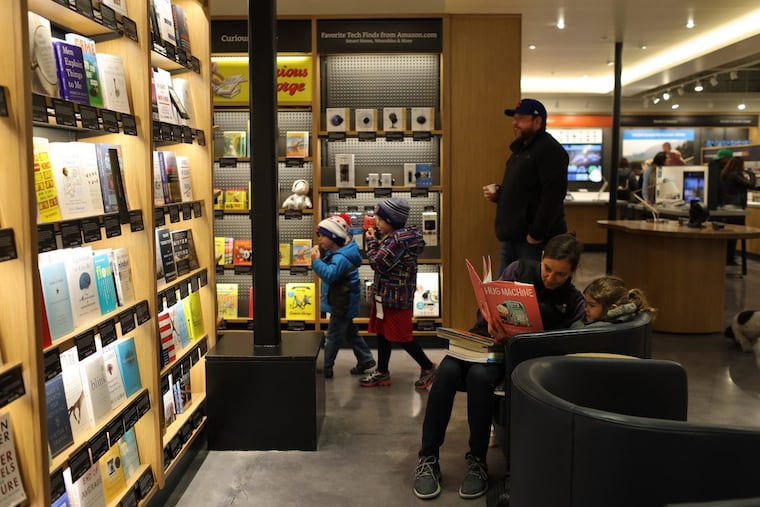Store-killer Amazon shows physical retail still matters
Jeff Bezos's company has made a habit of pursuing projects that seem baffling to outsiders but more than pay off.

Amazon helped kill bookstore chains, and now it's becoming one.
The company has been opening physical bookstores in cities like Seattle, San Diego, and Chicago since 2015. Last week, it opened its seventh bookstore in an upscale mall in New York City. In an ironic twist, Amazon's store is one floor up from a former Borders store, the bookstore outlet that went belly up in 2011 after failing to compete with Amazon.
Like many aspects of the notoriously secretive Amazon, it's still unclear what the company is trying to get out of its take on the bookstore. Jeff Bezos's company has made a habit of pursuing projects that seem baffling to outsiders but more than pay off. Few people anticipated Amazon would become a significant distributor of TV shows and movies, or reorder corporate technology with pay-by-the-hour computing at its Amazon Web Services division.
While the company deserves the benefit of the doubt, running stores is replete with annoyances large and small. And the potential financial payoff in books doesn't seem worth the trouble — unless Bezos has a strategy up his sleeve to use his bookstores for other purposes, such as test labs for new technologies for physical stores.
To step back a bit, Amazon is tiptoeing into bricks-and-mortar retail in a few different ways. In addition to its handful of bookstores — and more are coming — Amazon is also working on several store concepts for groceries and prepared foods. The company is testing a highly automated convenience store in its hometown of Seattle, and Amazon is trying spots for people to drive in and pick up groceries they ordered online. Full-fledged Amazon supermarkets are likely coming next.
It's sensible for Amazon to turn to physical food locations in its quest for a bigger chunk of shoppers' budgets. In the U.S., buying groceries accounts for about 30 percent of total U.S. personal spending excluding some categories such as cars and energy, according to a Morgan Stanley analysis. But food shopping has proved to be highly resistant to the e-commerce trend that has made Amazon a juggernaut. Only about 2 percent or so of all grocery shopping is online, analysts estimate.
It's smart of Amazon to try anything it can to get people to associate Amazon with food shopping. The company's flier on bookstores, however, is much harder to understand.
Amazon already sucked the life out of bookstores. As recently as 2009, U.S. bookstore and newsstand stands were higher than Amazon's total e-commerce sales in North America. Amazon has clearly bested the dead tree crowd now. Bookstore and newsstand sales shrank to $12 billion in 2015, according to the most recently available figures from the U.S. Census Bureau. Amazon's North America e-commerce revenue was more than five times that figure.
The fun mental exercise is to imagine not-obvious strategic purposes for the bookstores swirling in Bezos's fertile mind.
For example, Amazon's experimental convenience store is a showcase for technology that would allow people to grab items, walk out, and have the charges billed to their accounts — without visiting a register. Amazon is reportedly having problems with this technology, but what if the bookstore is another place the company can try grab-and-go payments? (An Amazon books executive deflected questions about this or other potential future uses for the bookstores.) Amazon is allergic to any tiny step that stands in the way of people buying stuff, and automated payments for physical stores could remove a speed bump in shopping.
Amazon's bookstores also devote significant real estate to its in-house electronics, including the Kindle book readers, its hardware to stream online video to TV, and voice-activated home speakers that have proved to be a surprisingly effective strategic gambit. It's possible the company is finding it needs to demonstrate in person how Amazon hardware works and how best to use it in people's homes.
It's a funny concept, given how Amazon is largely responsible for gadget sales shifting away from stores. Amazon's physical locations show that even as online shopping swallows a bigger chunk of people's wallets, stores still matter. It's exactly the message that retailers are trying to convey as they get steamrolled by Amazon.
Shira Ovide is a Bloomberg Gadfly columnist covering technology. She previously was a reporter for the Wall Street Journal.